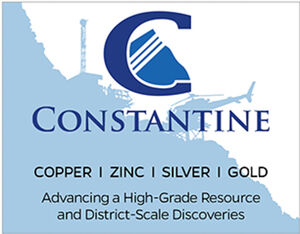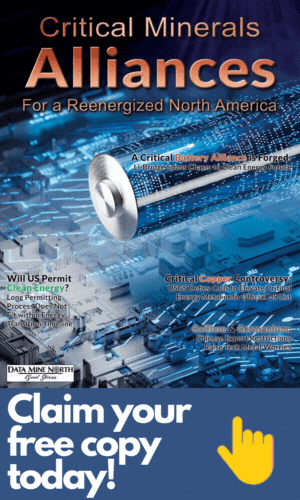Alaska asks SCOTUS to undo Pebble veto
North of 60 Mining News - July 28, 2023
Last updated 1/11/2024 at 10:18am

Adobe stock
The motion filed to the U.S. Supreme court by Alaska Attorney General Treg Taylor argues that EPA's veto of the Pebble copper project on state lands is an unconstitutional taking without just compensation and if the veto remains in place, the state is seeking monetary damages for breach of contract.
Seeks to protect state rights by forcing EPA to withdraw veto; if not, is asking for reparations for unjust taking.
After having its independence infringed upon by the Environmental Protection Agency's decision to exercise its veto authority under Section 404(c) of the Clean Water Act to lock away 309 square miles of state lands, effectively confiscating it and creating a de facto national park, Alaska's attorney general has filed a motion asking the U.S. Supreme Court to instruct the EPA to correct its overstep.
In January, the EPA issued its final determination for the Bristol Bay watershed in Southwest Alaska, known as a 404(c) veto, that not only prohibited permitting the Pebble project according to a 2020 mining plan but also restricted any future permitting to construct or operate a mine across a 300-square-mile region surrounding the world-class Pebble copper deposit.
"The EPA action usurps the State's ability and responsibility to protect its own natural resources," the Alaska Department of Law penned in its release.
Issued by Alaska Attorney General Treg Taylor, the motion for leave – essentially a legal procedure that asks the court permission to deviate from established rules – to file a bill of complaint – generally the first document filed in a lawsuit – that strongly argues that EPA's veto of the Pebble project is a breach of contract between Alaska and the United States, and violated the federal statutory recognition and implementation of the Cook Inlet Land Exchange.
In addition to requesting withdrawal of its decision, the motion also argues that EPA's veto violates the Administrative Procedure Act and is an unconstitutional taking without just compensation and, therefore, also seeks monetary damages for breach of contract.
"The State seeks a declaration that the EPA's veto is unlawful and an order setting it aside and enjoining its enforcement," the brief requests. "Alternatively, the State seeks damages for a breach of contract and just compensation for a taking."
Cook Inlet Land Exchange
To understand the significance of this violation, a little history is in order.
After the passage of the landmark Alaska Native Claims Settlement Act of 1971, a hard-fought battle by Indigenous Peoples of Alaska to retain their ancestral homelands, one of the 12 land-owning Alaska Native corporations formed under ANCSA, the Cook Inlet Region, Inc. was left between a rock and a hard place.
This corporation, better known as CIRI, expected to receive 1.25 million acres of surface estate and 2.25 million acres of subsurface estate within the Southcentral Alaska region. There was only one problem; the CIRI region covers the most populated part of the state.
CIRI was faced with the reality that much of this land was already in the hands of private, state, and military or was off-limits for national parks and protected wildlife, leaving glaciers and mountaintops for land entitlement selections.
Thus, CIRI leaders refused to accept what would have been inadequate selections and began another battle to obtain resource-rich lands outside of its region of Southcentral Alaska.
Through vision and perseverance, the company negotiated a deal, the Cook Inlet Land Exchange, a three-way exchange with Alaska and the federal government that helped lay the foundation for CIRI's future successes, including a solid financial grounding.
The land that now hosts the giant Pebble copper-gold-silver-molybdenum-rhenium deposit in Southwest Alaska was among the properties selected by CIRI and traded to Alaska during the three-way land swap.
As part of what remains as one of the largest land exchanges in U.S. history, the federal government received lands to create the Lake Clark National Park east of Pebble.
Hitting the hive
By taking the unorthodox approach of bypassing the lower courts and going straight to the U.S. Supreme Court, Alaska hopes to assert its sovereignty when it comes to managing state lands, especially lands that host more than half a trillion dollars of copper, gold, molybdenum, and other metals.
"An original action, where a case is heard directly by the Supreme Court instead of first progressing through the lower courts, is an extraordinary ask, but it's appropriate given the extraordinary decision being challenged," said Attorney General Treg Taylor.
In his brief, Taylor was concise in the state's concerns.
"No other State in the union depends so greatly on its lands for its prosperity," the brief contends. "Unlike most States, Alaska is constitutionally required to protect its natural resources. The State must provide for the 'conservation of all natural resources belonging to the State, including land and waters, for the maximum benefit of its people.'"
Nonetheless, EPA vetoed Pebble Limited Partnership's plans for mine development before state procedures could perform its due diligence for the project on Alaska lands.
"Alaska has some of the most robust environmental permitting requirements in the world ensuring development of critical natural resources occurs side-by-side with protection of human health and the environment," said Commissioner of the Alaska Department of Environmental Conservation Jason Brune. "Congress intended Alaska to have primary responsibility over land and resource management decisions under the Clean Water Act's framework of cooperative federalism. EPA robbed us of this opportunity."
Even after being denied permits by the U.S. Army Corps of Engineers, this does not end actions Pebble can take to remedy its mining plans to better accommodate Alaska's stringent environmental requirements.
However, EPA's decision, made before further examination could be undertaken, did just that.
"Alaska's Title 16 permitting process is designed to ensure conservation of fish and fish habitat. But these statutory protections were flouted by EPA before Alaska's expert habitat and fish biologists had the opportunity to weigh in," according to Alaska Department of Fish & Game Commissioner Doug Vincent-Lang. "The State's career experts should be allowed to do their job without having Washington bureaucrats swooping in to prohibit an action before we even received a permit application."
Uniquely autonomous in its land use, Alaska has had many ups and downs since its granting of statehood. Because of its remote location and harsh conditions, the state's founding constitution allows it to utilize its natural resources for the betterment of its people.
To have set a precedent by nailing the coffin shut before further deliberation could be undertaken has left many Alaskans rubbing their cheek.
"Our constitution is clear: Alaska is responsible for utilizing, developing, and conserving all of the State's natural resources for the maximum benefit of its people," said Alaska Governor Mike Dunleavy. "Bureaucrats in Washington D.C. are exercising unbridled and unlawful power to choke off any further discussion on this important decision affecting so many Alaskans."
Pebble's response
Northern Dynasty Minerals Ltd., parent company to Pebble Limited Partnership, weighed in on the case that will ultimately decide its fate.
"The Bill of Complaint filed by Alaska is a welcome development in the long Pebble saga," said Ron Thiessen, president and CEO of Northern Dynasty. "Northern Dynasty strongly, and I mean very strongly, supports all of the arguments set forth by the State and we congratulate the State for bringing these claims directly to the U.S. Supreme Court."
Theissen said that Northern Dynasty intends to file its own briefs with the Supreme Court to support the State's case.
"In the mid 1970's, a three-way land exchange was negotiated between the U.S. Government, the CIRI Native Alaskan Corporation and the State of Alaska," added Thiessen. "The U.S. Government received land to create Lake Clark National Park. CIRI received land with valuable natural resources allowing it to become a profitable entity for its Alaska Native shareholders. The State of Alaska received land in the Bristol Bay region – where the Pebble Project is located – for the specific purpose of developing the mineral potential of that land. The EPA veto is the U.S. Government reneging on that deal. Both the U.S. Government and CIRI got the value they bargained for; if the EPA veto is not withdrawn, the U.S. Government has taken back the value the State of Alaska bargained for."
If the EPA does not reverse its veto, Alaska is asking the federal court to compensate the state for its losses associated with a breach of contract and a taking of property, a sum that could cost the federal government billions of dollars.
While a direct appeal to the Supreme Court is unconventional, there is procedure that can be undertaken to accommodate such actions.
The U.S. Constitution gives states the right to seek direct jurisdiction in the U.S. Supreme Court for complaints against the federal government.
The Supreme Court has interpreted this clause in the constitution as giving it discretionary jurisdiction and sets out several tests that must be met before it will accept such a case.
The papers filed by the state are stated to show that those tests are met and that the Supreme Court should grant jurisdiction to hear the case. Alaska also contends that such jurisdiction is not discretionary, and the Supreme Court must accept jurisdiction of this case.
It is anticipated that the Supreme Court could decide whether to hear this case as early as October.











Reader Comments(0)